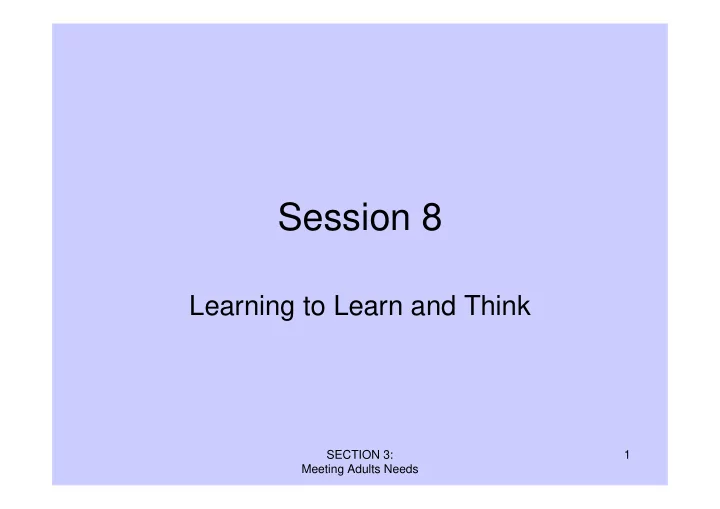

Session 8 Learning to Learn and Think SECTION 3: 1 Meeting Adults Needs
These are the areas of the brain concerned with the processes of remembering and paying attention (so important to thinking and learning) SECTION 3: 2 Meeting Adults Needs
Cookery • Freda understands a few single words in context. She loves pictures and photos, music, dressing up and watching her mum cook. • Take 10 minutes to discuss how you could introduce a regular cookery session and help Freda to remember to go to the session and start to learn a cookery skill. SECTION 3: 3 Meeting Adults Needs
Multisensory approach If we want people to remember better then we need to use a multi-sensory approach. SECTION 3: 4 Meeting Adults Needs
Repetition It is very likely that your discussion will have involved the importance of a clear routine and very frequent repetition probably backed up by the systematic use of cues. SECTION 3: 5 Meeting Adults Needs
Active learning The examples that help understanding need to employ ‘active learning’. That does not necessarily mean adults have to be physically active, but they have to have active minds. They need to be engaged with the learning so they can do something with it. In practice, because most adults with SLD find abstract learning so difficult, they will need concrete examples. They will need to be doing. SECTION 3: 6 Meeting Adults Needs
Motivation ‘I should start from where the person is and not where I think they should be - but I can’t leave them there.’ Motivation is the key. Ideal activities are regular and interesting to the person that you are supporting. SECTION 3: 7 Meeting Adults Needs
Metacognition • Where possible teach adults to talk about thinking • Use words such as think, ask question, remember, imagine, pretend, guess. • Cartoons with thought bubble pictures can be very helpful SECTION 3: 8 Meeting Adults Needs
Memory Games Play Kim’s Game What’s missing? SECTION 3: 9 Meeting Adults Needs
Pub Games Pub games can be enjoyable and stimulating SECTION 3: 10 Meeting Adults Needs
Problem Solving Avoid being too helpful. Consider setting up situations where someone has to problem solve. For example you might decide not to put out all the equipment and see if someone can get the missing item. SECTION 3: 11 Meeting Adults Needs
Teaching anticipation • Lots of ‘burst-pause’ activities • Repeat the activity several times and then stop and watch the reaction • Keep repeating until you feel the adult knows what is going to happen next • Remember this can take hundreds of repeats SECTION 3: 12 Meeting Adults Needs
A Useful Tool • Routes for Learning is excellent for assessing and developing early thinking skills. • Get it free from 0870 2423207 SECTION 3: 13 Meeting Adults Needs
Using the community • Investigate sources of learning in the community. • See what is available at the local college. SECTION 3: 14 Meeting Adults Needs
Recommend
More recommend